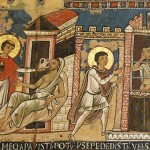We run our website the way we wished the whole internet worked: we provide high quality original content with no ads. We are funded solely by your direct support. Please consider supporting this project.

Caught Between Two Conflicting Truths
In my previous blog I tried to show that adopting a “Christocentric” approach to Scripture isn’t adequate, as evidenced by the fact that people adopting this approach often come to radically different conclusions. In fact, it seems to me that the “Christocentric” label is often close to meaningless inasmuch as it doesn’t meaningfully contrast with anything. If a “Christocentric” perspective doesn’t conflict with the portrait of God commanding his people to murder every last woman and child while threatening to punish anyone who shows mercy, then honestly, what does the label even mean? To remedy this, I proposed that we adopt a cross-centered approach, arguing that this sharper focus is justified inasmuch as the cross is the thematic center of everything Jesus was about.
I’d now like to begin unpacking some of the implications of this cross-centered approach to Scripture. And a good place to begin is with the genocidal portrait of God I just mentioned. While some may imagine that a Christocentric view of God doesn’t rule out God commanding the merciless murder of women and infants, I submit that a cruciform portrait of God certainly does. Jesus reveals a God who chose to refrain from using his power to crush enemies and chose instead to give his life for them. And he reveals a God who taught us, and modeled for us, a completely non-violent, loving, servant way of responding to hostile enemies.
But this immediately presents us with a problem. Throughout the Gospels, Jesus expresses absolute confidence in the OT as the Word of God. In fact, a number of scholars have argued that this conviction lies at the heart of Jesus’ self-understanding. While I don’t believe Jesus was omniscient while on earth, I find it impossible to confess him as Lord while correcting his theology, especially about such a foundational matter. He once asked, “Why do you call me ‘Lord’ when you don’t do the things that I say?” I think he could have made a similar point by asking, “Why do you call me ‘Lord” when you don’t believe the things I teach?” And one of the things Jesus taught was that the OT is the Word of God!
Not only this, but going back to the apostle Paul, the Church has always understood Scripture to be “God-breathed” (1 Tim. 3:16) – a conviction that came to be applied to Paul himself along with the other NT authors from the second century on. While I don’t regard Church tradition to be infallible, it certainly carries a great deal of weight, especially on matters as foundational as this one, on matters that go back to the very beginning of the church’s existence, and on matters such as this one about which there has never been any significant disagreement. When the church’s uniform view of Scripture is combined with the authority of Christ, I find I am compelled to accept that all Scripture – including its multitude of horrific portraits of God – are “God-breathed.”
So I find myself awkwardly caught between two seemingly contradictory yet equally non-negotiable truths. On the one hand, I feel compelled to confess that God looks like Jesus, choosing to die for enemies and at the hands of enemies rather than use his power to crush them. On the other hand, I feel compelled to confess that all Scripture is God-breathed, including its portraits of God that look antithetical to the God who died on a cross for his enemies.
What are we to do?
Stay tuned.
_____
Note: This article was originally published on the temporary blog Greg used prior to the launch of ReKnew.org.
Image by Quinn Dombrowski. Used in accordance with Creative Commons. Sourced via Flickr.
Category: General
Tags: Cruciform Theology, Jesus, Old Testament, Scripture, Violence
Related Reading

The Greatest in the Kingdom (2 of 2)
Article by Natalie Frisk This post is a summary of what was discussed at the ReKnew CrossVision Conference in regard to what and how we teach our kids about the cruciform hermeneutic. Taking Jesus into the Old Testament I co-lead a family-friendly home church where we sometimes get into spiritually deep conversations with children. There…

Violent Parables?
Some try to argue that Jesus did not make loving enemies and refraining from violence an absolute mandate. They make their case on the basis of several passages from the Gospels. The first concerns the cleansing of the temple which we addressed here, while the second is about how Jesus spoke harsh words to the…

Is the open view the only view that is compatible with the Incarnation?
Question: You have said that the Open view of God is the only view that squares with the Incarnation and the only view that truly exalts God’s greatness. On what basis do you say this? Answer: The revelation of God in the Incarnation is the ultimate expression of God’s willingness and ability to change that…

Did Jesus Encourage a Flat Power Structure in the Church?
Greg talks about church leadership. http://traffic.libsyn.com/askgregboyd/Episode_0053.mp3

Is Jesus Unique?
The Search for a Non-Unique Jesus Built into the naturalistic assumption that drives the liberal New Testament search for the “man behind the myth” is the notion that, whoever Jesus was, he cannot have been utterly unique. The laws that operate in the world today, including the laws of human behavior, have always operated. And…

The Call to a Cruciform Life
Jesus repeatedly taught that following him meant that one had to be willing to “pick up their cross daily and follow [him]” (Lk 9:23; 14:27). Picking up our cross is the centerpiece of following Jesus because this was the centerpiece of what Jesus was all about. The thematic centrality of the cross is also illustrated…
